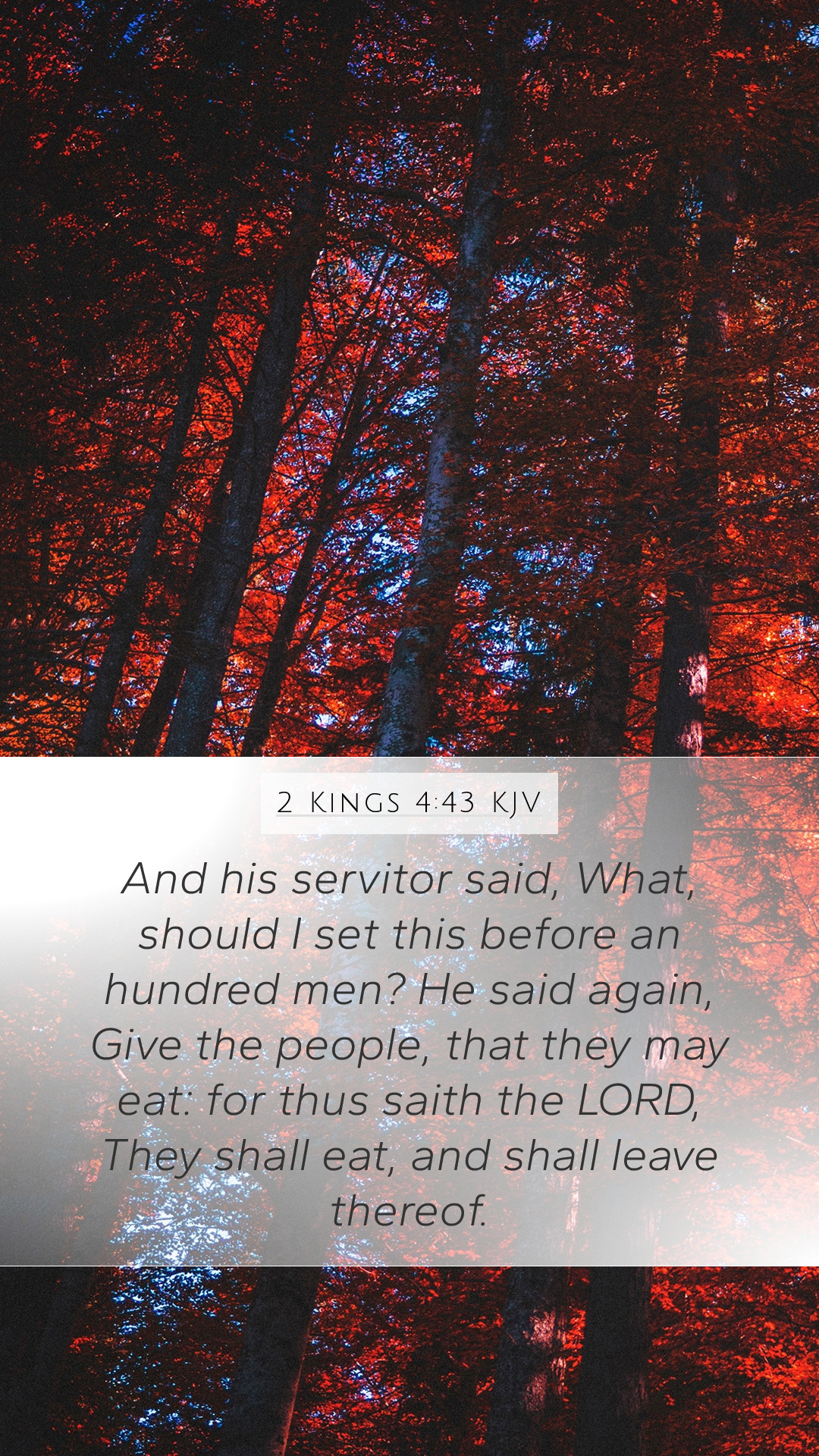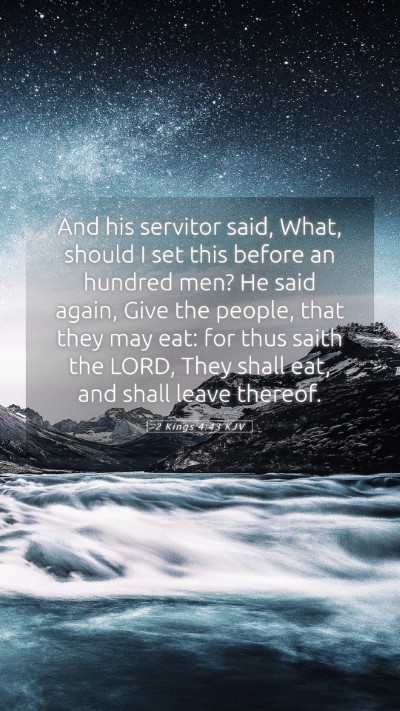Understanding 2 Kings 4:43: A Comprehensive Commentary
2 Kings 4:43 states, "But his servant said, 'What, should I set this before a hundred men?' He said again, 'Give the people, that they may eat: for thus saith the Lord, They shall eat, and shall leave thereof.' This verse encapsulates a significant moment in the ministry of Elisha, illustrating themes of abundance, faith, and divine provision. Below, we will delve into various public domain commentaries to extract a deeper understanding of this passage.
Bible Verse Meanings
The overarching meaning of 2 Kings 4:43 revolves around the miraculous nature of God's provision. Elisha's instruction to serve food to a hundred men reflects his trust in God's promise that there would be enough for all, despite a seemingly impossible situation. This highlights the faith required to act on God's word, as discussed by Matthew Henry, who emphasizes God's power to provide abundantly, even from what appears to be insufficient resources.
Bible Verse Interpretations
In the interpretation of this verse, commentators such as Adam Clarke point out the practical challenge faced by the servant. The servant's doubt is a natural human response when confronted with limitations. Clarke notes that Elisha's confidence in God's command illustrates the importance of believing in God's words over our own understanding. This is a common theme found throughout Scripture, where God often asks His people to act in faith, even when circumstances suggest otherwise.
Bible Verse Understanding
Understanding this passage also requires a look at the historical context. During a time of famine, food scarcity was prevalent, which made Elisha's command all the more astonishing. The act of feeding a hundred men with a small quantity of bread signifies not just a physical miracle but also serves as a spiritual lesson about God's ability to meet needs in our lives today. As Albert Barnes explains, this narrative serves as a reminder that God's resources exceed our human limitations.
Bible Verse Explanations
The explanation of 2 Kings 4:43 reveals a deeper theological insight about God's providential care. Elisha's actions are not simply about the reversal of scarcity but a demonstration of the vision of God's kingdom, where no one is left wanting. In this way, the miracle foreshadows the later teachings of Jesus, who also fed the multitudes, reinforcing the idea that God cares for both our physical and spiritual needs.
Bible Verse Commentary
- Faith in Action: Elisha's insistence on serving the food despite the servant's doubts highlights the necessity of faith in God's promises.
- Miraculous Provision: The outcome that everyone ate and had leftovers is a vivid reminder of God's ability to provide abundantly beyond our expectations.
- Teacher of Generosity: The act of sharing what little is offered reflects the biblical principle of generosity and communal support.
Scripture Analysis and Biblical Exegesis
An in-depth scripture analysis reveals the structural components of the verse that contribute to its meaning. The dialogue between Elisha and his servant serves as the tension that is resolved by God's miraculous action. This moment parallels with other biblical passages, providing a framework for understanding divine intervention in human affairs.
Bible Study Insights
For those engaging in Bible study groups or online Bible study, this verse offers rich themes for discussion. Consider exploring how the principles of faith and God's provision can be applicable in our modern lives. This encourages not only theological reflection but also practical applications for daily living.
Cross References
- John 6:1-14 - The feeding of the 5,000 provides a New Testament parallel to God's miraculous provision.
- Matthew 14:15-21 - Another account of Jesus feeding a large crowd reinforces the theme of abundance in God's kingdom.
- Psalm 37:25 - "I have been young, and now am old; yet have I not seen the righteous forsaken, nor his seed begging bread," which speaks to God's ongoing provision for His people.
Conclusion
In conclusion, 2 Kings 4:43 serves as a powerful reminder of God's ability to exceed our expectations and the importance of trusting in His word. As Bible study resources and guides continue to explore this verse, it encourages believers to cultivate a deep understanding and application of Scripture. Whether in personal study or group discussions, the insights from this passage can transform our perceptions of divine provision and challenge us to respond in faith.


